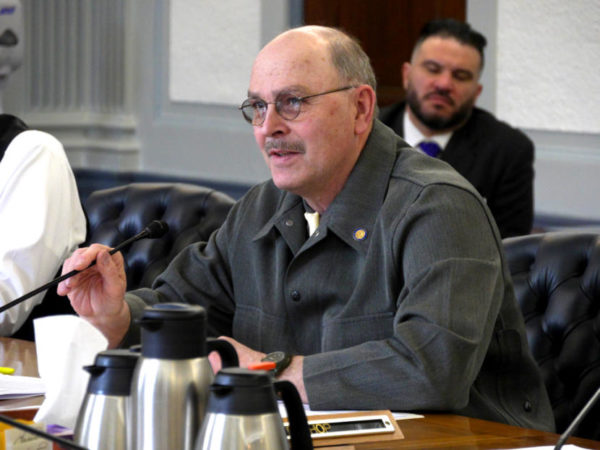
Some Alaska state senators are aiming to pass a bill that would extend Gov. Mike Dunleavy’s disaster declaration, but limit its powers.
The end of the month is the deadline for the Legislature to pass a bill — and for Dunleavy to sign it — or low-income Alaskans will lose $8 million in emergency food aid.
On Monday, the Senate Finance Committee introduced a new version of House Bill 76, which the House passed on March 26.
Fairbanks Republican Sen. Click Bishop said the goal of the bill is to allow the state to collect additional food aid, as well as assist with COVID-19 response in areas such as distributing vaccines.
But he said the committee listened to the administration in offering a more limited bill.
“We’ve heard loud and clear that the governor didn’t need all these powers, and so we’ve acted accordingly,” he said.
This bill is a middle ground between what the House passed, and the even-more limited measure the governor wanted.
It would extend Alaska’s disaster declaration through the end of the year, allowing Alaskans to receive $72 million in food aid. Bishop said the money will help people who have been disproportionately affected by the pandemic.
“We talk about wanting to help the economy and people in need,” he said. “We all know that the highest percentage of unemployed Alaskans is [among] those that are making less than about $40,000 a year. They’re the ones in the greatest need.”
In February, the average additional Supplemental Aid to Needy Families benefits in Alaska ranged from $265 in urban areas to $436 in the most rural areas.
That extra food aid wasn’t sent to Alaska families earlier this month, though regular benefits were distributed. Families could get the additional benefits retroactively, a spokesperson for the state Department of Health and Social Services said: It’s the department’s understanding Alaska will be eligible to receive the additional April aid if a law complying with federal emergency requirements is enacted by the end of the month.
The bill would give Commissioner of Health and Social Services Adam Crum more public health emergency powers during the pandemic similar to what’s being done in Michigan, another state without a disaster declaration.
Some lawmakers would like to make permanent changes to state law allowing for limited public health emergency powers, rather than full range of powers a governor has under a disaster declaration.
The Senate Finance version of the bill won’t just help families: It will also have an effect on the state budget.
The bill would would limit the administration’s ability to spend federal relief funds in areas the Legislature hasn’t already approved. Sitka Republican Sen. Bert Stedman said that may require the Legislature to meet in special session.
“It’s to ensure that the Legislature convenes and exercises its appropriation authority dealing with these substantial dollars coming from the federal government,” he said.
But, he said, federal pandemic aid won’t solve the state’s long-term budget problems.
“It does not fix our structural deficit. Let’s be very clear about that,” he said. “This is just frosting on a lumpy cake, to make it look nice and smooth, right? So it doesn’t fix the underlying issues that we’re struggling with.”
Stedman said it’s likely the Legislature will pass a plan to use federal funds from the American Rescue Plan by the May 19 deadline to end the session. But he said it’s important the Legislature also pass a plan for any new, large amounts of federal money that come in after the session ends.
Andrew Kitchenman is the state government and politics reporter for Alaska Public Media and KTOO in Juneau. Reach him at akitchenman@alaskapublic.org.




